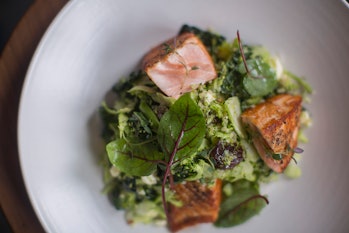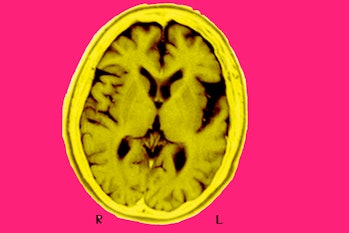- In the absence of a cure for Alzheimer’s disease, scientists are looking to nutrition
You are what you eat. But what you eat also shapes who you become.
Decades of nutritional studies repeatedly confirm this. However, missing from the equation was a diet specifically tailored for brain health. Realizing this, the late Martha Clare Morris, a nutritional epidemiologist, studied foods and nutrients associated explicitly with lower cognitive decline and lower risk of Alzheimer’s disease, and in 2015, premiered the MIND diet.
The MIND diet is a hybrid of the Mediterranean diet and the Dietary Approaches to Stop Hypertension diet (its name is a combo of those two diets). And it just passed its latest test.
In a study published in September in the Journal of Alzheimer’s Disease scientists show the MIND diet can slow cognitive decline and reduce the risk of Alzheimer’s disease dementia.
This held true despite the fact that study participant’s brains still developed the abnormal clumps of proteins associated with Alzheimer’s disease.
First author Klodian Dhana is an assistant professor at Rush University. His focus is on identifying risk factors of dementia. In the absence of a cure for Alzheimer’s disease, scientists aim to identify which modifiable lifestyle factors can lower the risk of cognitive decline. Nutrition, he tells me, “has gained interest because it can be readily modified.”
“I hope the findings of this study motivate people to practice a healthier lifestyle through nutrition, exercise, and cognitive activities,” he says.
How the discovery was made —Dhana and colleagues examined data pulled from Rush University’s ongoing Memory and Aging Project representing 569 participants. These individuals lived in the greater Chicago area and began sharing their vitals in 1997. In 2004, an annual food frequency questionnaire was thrown into the mix, which evaluated how often they ate specific foods. All participants agreed to undergo clinical evaluations while they were alive and a brain autopsy when they died.
Each participant was assigned a MIND diet score based on how closely they adhered to meals within it. Within the MIND diet are 10 brain-healthy food groups and five unhealthy groups: The unhealthy group includes butter and stick margarine, cheese, fried and fast food, pastries and sweets, and red meat.
Correctly following the MIND diet involved daily consumption of:
- At least three servings of whole grains
- A green leafy vegetable
- One other vegetable
- A glass of wine
Also included were nuts as snacks, beans every other day, poultry and berries twice a week, and fish at least once a week. Proper adherence included limiting consumption of the items in the unhealthy foods group.

Overall, about 70 percent of the participants were women, the mean level of education was 15 years, and the average age at death was 91 years.
Participants with a higher MIND diet score were also found to have better memory and thinking skills as they became older. But autopsies of their brains revealed something staggering: While some brains contained the protein deposits commonly found in the brains of people with Alzheimer’s disease — enough to merit a postmortem diagnosis — they never developed clinical dementia.
This suggests the MIND diet supports cognitive function, regardless of pathologies related to Alzheimer’s disease. The results align with previous findings: For example, the MIND diet is also associated with delaying the onset of Parkinson’s disease and causing the brains of elderly adults to effectively function as if they are 7.5 years younger than their peers.
Why the MIND diet works
While it’s established the MIND diet contributes to cognitive resilience, it seemingly doesn’t influence how the brain physically changes. So why can it still help?

It may come down to the antioxidative, anti-inflammatory, and neuroprotective elements within the food included in the diet. These foods are known to protect the brain, regardless of your age.
The study authors point to green leafy vegetables and nuts: These are rich in nutrients, including Vitamin E. Vitamin E, in turn, is an antioxidant that protects neurons from damage related to oxidative stress.
While studying the MIND diet, Dhana has found himself adopting it.
But brain resilience goes beyond food, he explains: Dhana also recommends engaging in at least 150 minutes of moderate and vigorous physical activity a week, and focusing on cognitive activities like reading books, visiting museums, and playing puzzle games.
The above article was first published in Inverse, https://www.inverse.com/mind-body/mind-diet-brain-health





